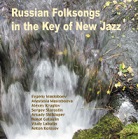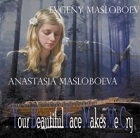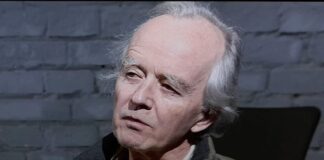 Irkutsk is a large city in southern Siberia, the cultural center of excellence for the region and the midpoint of the Trans-Siberian railway line, although in recent times it has come to the fore for UFO sightings; this city of about 600,000 inhabitants offers an entire art to share with the world, especially after the opening of the Russians to the ideas of the post-Gorbachev. It is a place that offers not only the cold, but also many virtues with a strong influence of Chinese culture (which is adjacent), Irkutsk has established traditions that are in the middle of the cultures of the two countries (Russia and China), an example in music is the knowledge of percussion Evgeny Masloboev and his daughter Anastasia who impressed Leo Feigin, so that they became a fixed group of the label capable of recording five cds of music to which give a definition of genre is extremely difficult: it is a modern mixture in which play important roles improvisation (with different nuances) and ethnic origins, constituted each time from popular songs, which are filtered through the perspective of the feeling that more they want to highlight: Russian songs “In the key of rhythm “” In the key of sadness “,” In the key of winter. “
Irkutsk is a large city in southern Siberia, the cultural center of excellence for the region and the midpoint of the Trans-Siberian railway line, although in recent times it has come to the fore for UFO sightings; this city of about 600,000 inhabitants offers an entire art to share with the world, especially after the opening of the Russians to the ideas of the post-Gorbachev. It is a place that offers not only the cold, but also many virtues with a strong influence of Chinese culture (which is adjacent), Irkutsk has established traditions that are in the middle of the cultures of the two countries (Russia and China), an example in music is the knowledge of percussion Evgeny Masloboev and his daughter Anastasia who impressed Leo Feigin, so that they became a fixed group of the label capable of recording five cds of music to which give a definition of genre is extremely difficult: it is a modern mixture in which play important roles improvisation (with different nuances) and ethnic origins, constituted each time from popular songs, which are filtered through the perspective of the feeling that more they want to highlight: Russian songs “In the key of rhythm “” In the key of sadness “,” In the key of winter. “Evgeny is probably the creator of the musical proposal: extended drumming, which is based not only in the normal instruments of percussion, but also involves various objects made of metal (even kitchen pots), Evgeny also plays other instruments including a traditional flute. Anastasia has a voice to the limit of the childish, which recalls the contrast between East and West, where in some circumstances you can perceive the Russian dolls so close to the early Kate Bush and in others you may instead find yourself in front of a local shop where a China popular voice is heard. The folk singing of Anastasia intersects with many traces of the religious tradition of the place (which goes back to Gregorian chant and Byzantine), but the connection with Evgeny is quite natural, since his drumming is at the service of music with natural modal character: in this scenario are inserted parts of genuine musical improvisation, this circumstance allows (without presumption of assignment of a specific genre) to build a side more developed in Western pop (In the key of Rhythm), a side of free improvisation (In the key of sadness), one in the church choral music (In the key of winter).
The two musicians present their latest collections: for “Russian folksongs in the key of New Jazz” was made a meeting between the two Siberian artists and a pool of promising young Russian musicians in Moscow: in this combination of artistic depth determined by the actions of the Muscovites musicians (which turn out to be good improvisers), the music moves in the groove of In the key of sadness, with the singing of Anastasia (now folk, now church) hovering over a series of free improvisations of the participants. Here we talk about New Jazz, where the word “New” want to indicate a non-sterile re-examination of elements already known in music, but a universal appeal that uses the new road crossed by the music in the last fifty years:in this sense, the popular tradition is combined with live electronics (built in drone or eclectic pantomine), with the freedom of jazz’s most advanced, where even the folk tradition is extended with incursions into unexplored areas (with elements of shamanic chant that are typical of many other regions of the immense Siberia). The musical microcosm of the two Russian artists live in this wonderful contrast with an artistic breath shared between the ethereal and evocative, which takes you into the environment of Irkutsk, in its churches, its premises, its “reflective” squares and avoid presenting banality worthy of an unbalanced world music (listen to the wonderful contrast between the free sax Alexey Kruglov and the voice of Anastasia in “Siberian song”)
 “Your beautiful face makes me cry”, on the contrary, follows the line of In the key of Winter, where the project tries to focus on the interactions between traditions in and out of spiritual places; Evgeny, drawing on its ability to multi-instrumentalist (34 in total) with many instruments of local origin, offers a phonetic combination (not secondary) between Gregorian chant and Byzantine and Russian language, also including overlapping.
“Your beautiful face makes me cry”, on the contrary, follows the line of In the key of Winter, where the project tries to focus on the interactions between traditions in and out of spiritual places; Evgeny, drawing on its ability to multi-instrumentalist (34 in total) with many instruments of local origin, offers a phonetic combination (not secondary) between Gregorian chant and Byzantine and Russian language, also including overlapping.I think by now these two musicians should have a greater consensus than in the past: the main specialized magazines are still too mild in compliments, but in a hypothetical monthly magazine of music without barriers, these guys would be stars.
_____________________________________________________________________________
Irkutsk è una grande città nel sud della Siberia, il centro culturale per eccellenza di quella regione e il punto medio della linea ferroviaria transiberiana; sebbene negli ultimi tempi essa sia venuta alla ribalta per gli avvistamenti Ufo, questa città di circa 600.000 abitanti offre tutta una propria arte da condividere con il mondo, specie dopo l’apertura sovietica post-Gorbachov. E’ un posto che non offre solo il gelo ma anche tante virtù: con una forte influenza della cultura cinese (che gli è confinante), Irkutsk presenta consolidate tradizioni che stanno nel mezzo delle culture dei due paesi (Russia e Cina); un esempio nella musica è la conoscenza del percussionista Evgeny Masloboev e di sua figlia Anastasia che hanno impressionato Leo Feigin tanto da diventare un gruppo fisso dell’etichetta in grado di registrare cinque cds di musica a cui dare una definizione di genere è cosa ardua: si tratta di un moderno miscuglio in cui giocano ruoli importanti l’improvvisazione (con sfumature diverse) e lo stampo etnico, costituito ogni volta da canzoni popolari che vengono filtrate nell’ottica del sentimento che più si vuole evidenziare: Russian songs “In the key of rhythm”, “In the key of sadness”, “In the key of winter”.
Evgeny è probabilmente l’ideatore della proposta: percussionismo esteso, che si basa non solo nella normale strumentazione del percussionista, ma coinvolge anche oggetti vari di metallo (persino pentole da cucina), Evgeny suona anche altri strumenti tra cui risalta un flauto tradizionale. Anastasia ha una vocalità al limite dell’infantile, che richiama la contrapposizione tra oriente ed occidente, dove in alcuni frangenti potete scorgere le bambole russe tanto care alla Kate Bush degli esordi e in altri invece trovarvi di fronte ad un negozio di arti locali con voce popolare cinese; il canto folk di Anastasia si incrocia anche con molte tracce dell’antica tradizione religiosa del posto (che si riporta al canto gregoriano e bizantino), ma la connessione con Evgeny è quasi naturale, dato che quest’ultimo porta il suo percussionismo a servizio di una musica che in molti frangenti è modale per natura: ecco che quindi che si inseriscono parti di vera e propria improvvisazione musicale; questo permette (senza presunzione di attribuzione di una etichetta) di costruire un versante più sviluppato nel pop occidentale (vedi In the key of Rhythm), un versante nell’improvvisazione libera (In the key of sadness), uno nella coralità ecclesiastica (In the key of winter).
I due presentano le loro ultime raccolte: per “Russian folksongs in the key of New Jazz” è stato realizzato un incontro tra i due artisti siberiani ed un pool di giovani promettenti musicisti russi di Mosca: in questa non catalogabile prova dove lo spessore musicale viene accresciuto dagli interventi dei musicisti moscoviti (che si rivelano ottimi improvvisatori), viene intrapreso il solco di In the key of sadness, con il canto di Anastasia (ora folk, ora church) che si libra sotto una serie di improvvisazioni libere dei partecipanti. Da qui la chiave New Jazz, dove il New vuole indicare che non si tratta di una sterile rivisitazioni di elementi già conosciuti in musica, ma un universale richiamo che fa della novità l’aspetto importante, poichè tende ad utilizzare le nuove arterie che la musica degli ultimi cinquant’anni ha offerto: in tal senso la tradizione popolare si sposa con il live electronics (costruito in drone o con eclettiche pantomine), con le libertà del jazz più avanzato, dove la stessa tradizione folk viene ampliata con incursioni in zone inesplorate (con elementi di canto sciamanico che sono tipiche di molte altre regioni della vastissima Siberia). In questo meraviglioso contrasto vive tutto il microcosmo musicale dei due artisti, con un respiro che sta l’etereo e l’evocativo, che vi porta nell’ambiente di Irkutsk, nelle sue chiese, nei suoi locali, nelle sue piazze “riflessive”, evitando di presentare banalità degne di una world music sbilanciata (sentite il contrasto splendido tra il free del sax di Alexey Kruglov e la voce di Anastasia in “Siberian song”)
“Your beautiful face makes me cry”, invece, segue la linea di In the key of Winter, dove il progetto cerca di focalizzarsi sulle interazioni tra tradizioni dentro e fuori i posti spirituali: Evgeny, avvalendosi di un pluristrumentismo (34 in tutto) con molti strumenti di matrice locale, propone un connubio anche fonetico tra canto gregoriano e bizantino e linguaggio russo, anche mediante sovrapposizioni.
Penso che ormai questi due musicisti debbano avere un consenso maggiore di quello che, purtroppo, le riviste specializzate gli conferiscono; in un ipotetico mensile di musica senza barriere, questi signori sarebbero le stars.







